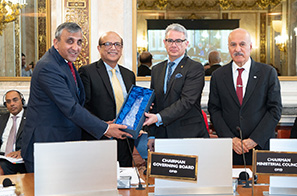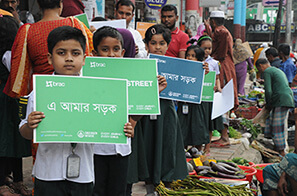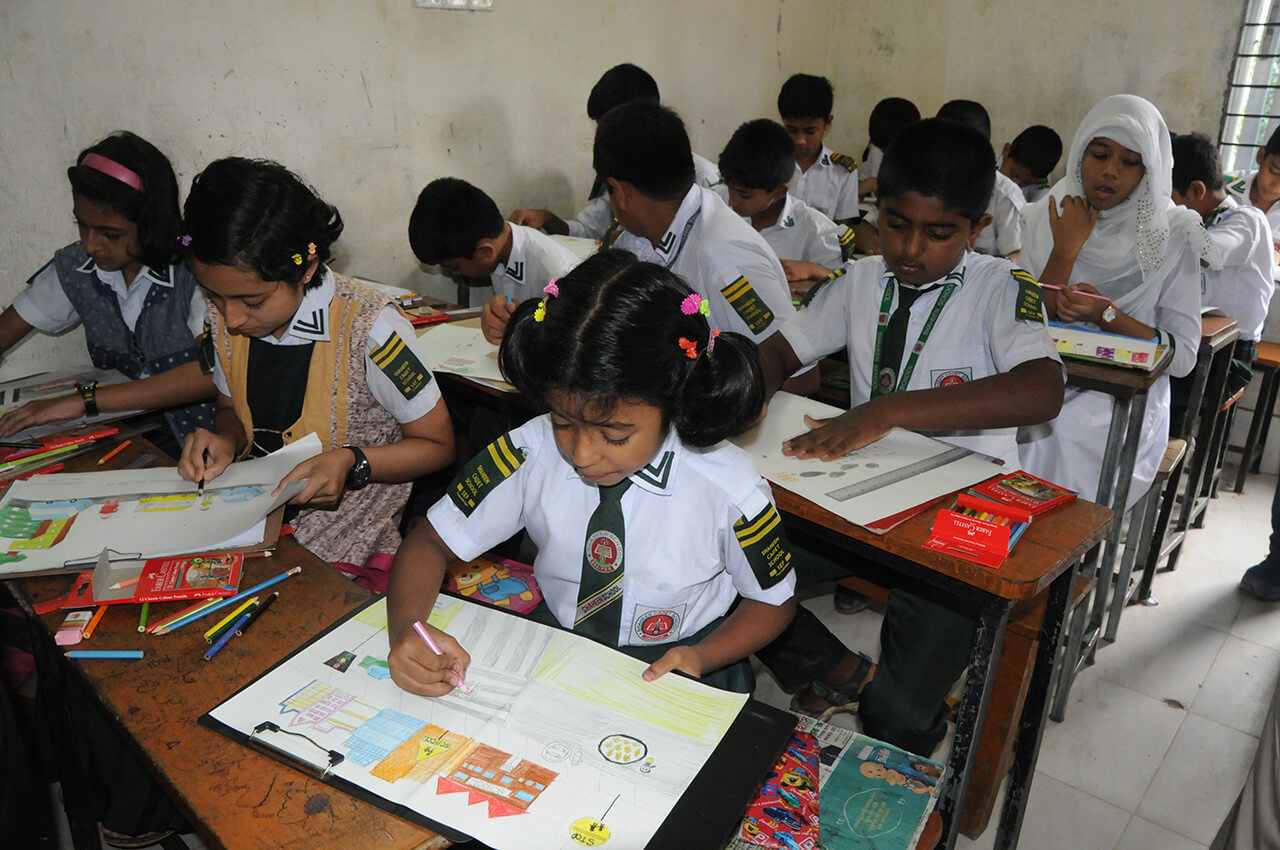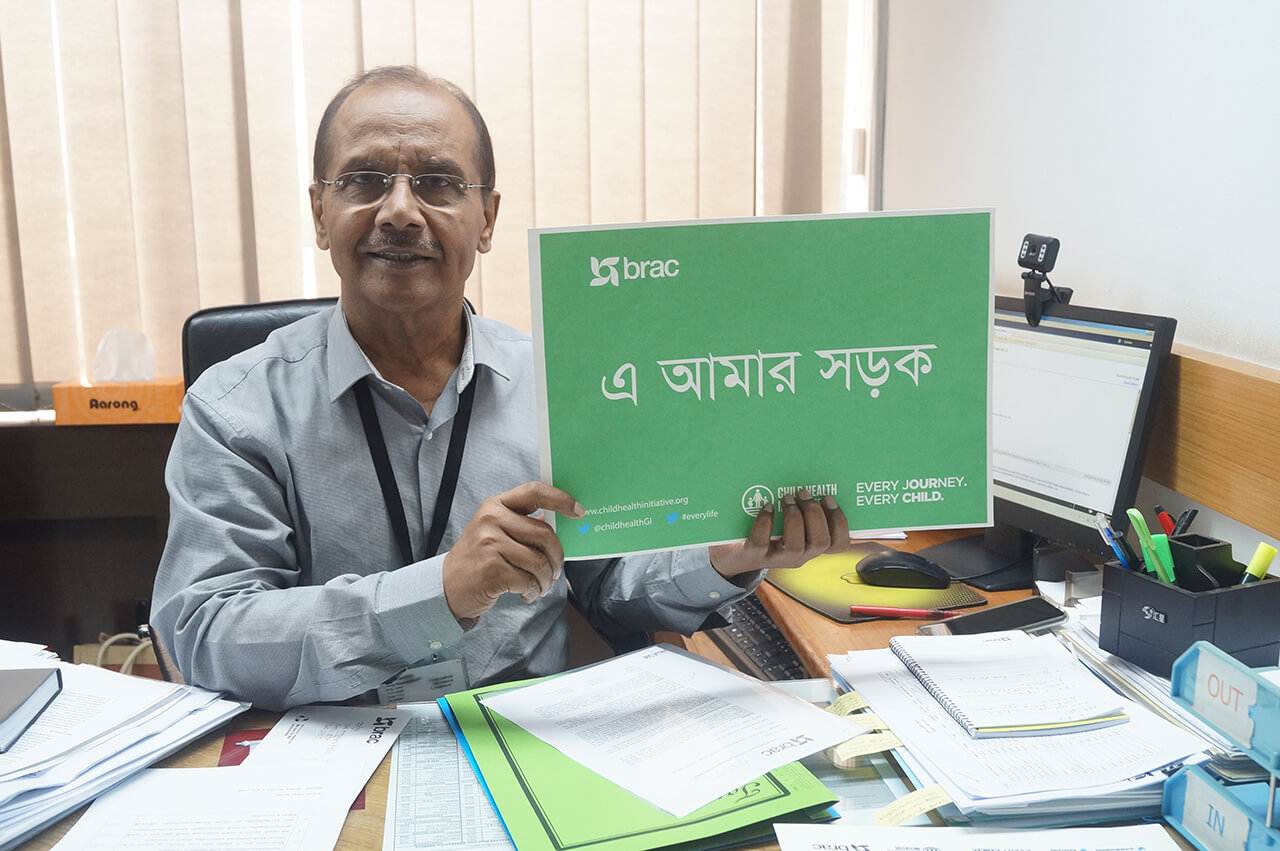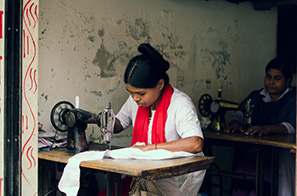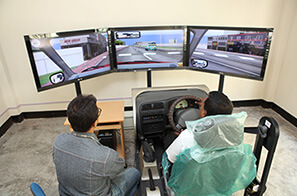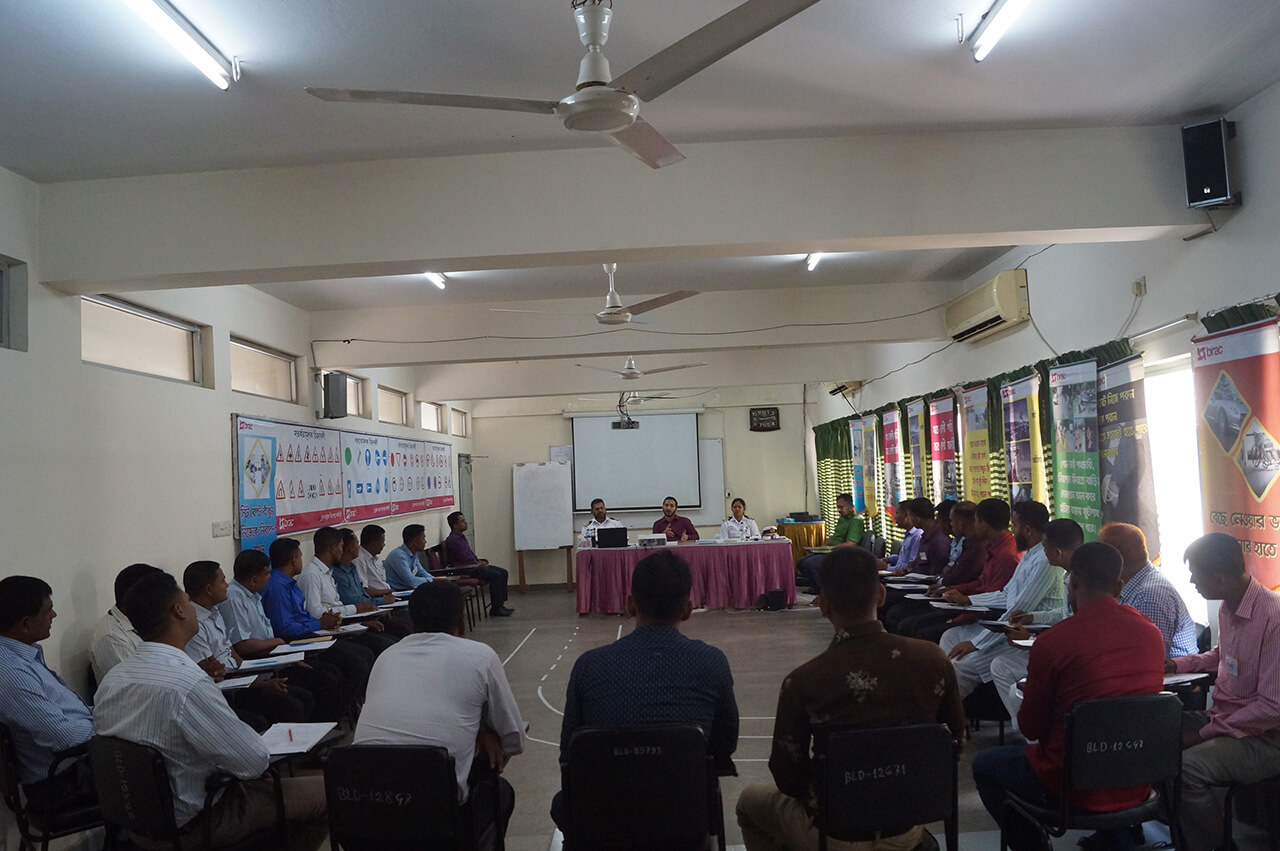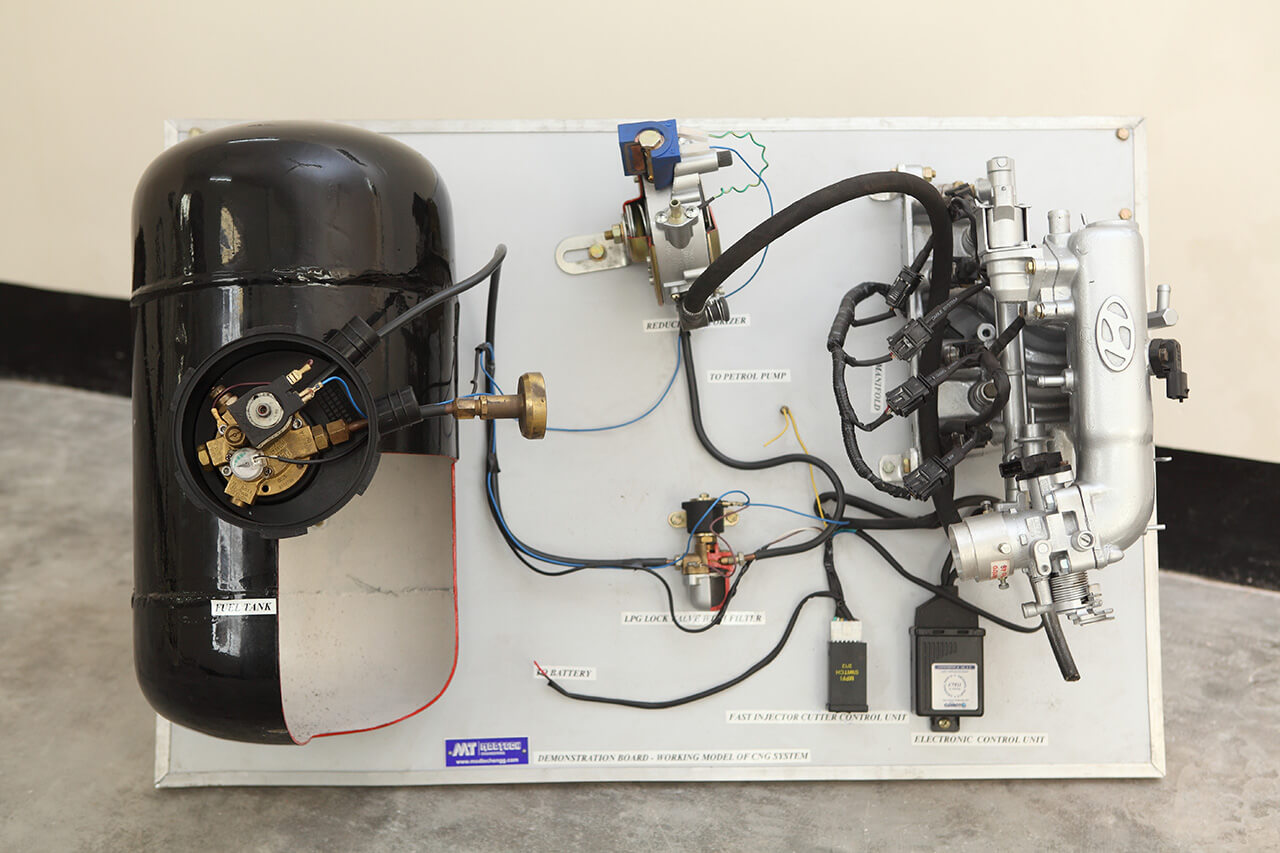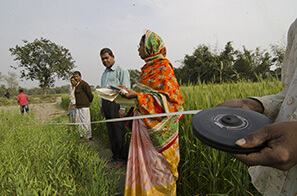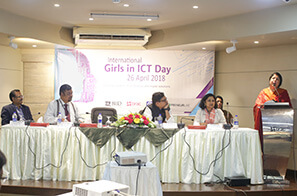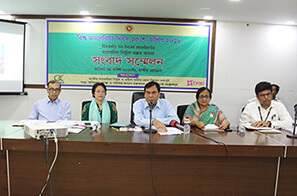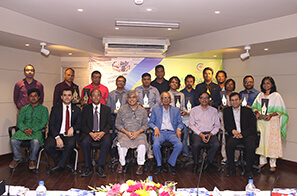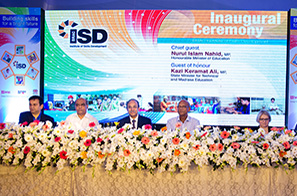
News (832)
Urban Innovation Challenge launched

Around 55 million people live in the cities and other urban areas of Bangladesh. With the ever increasing pressure of people bound for urban areas the problems in urban living are rising too. Social development organisation BRAC is encouraging and promoting the youths to take on these challenges with creative solutions. With this objective BRAC launched its second 'Urban Innovation Challenge' today on 24 July (Tuesday).
State minister for information communication and technology Zunaid Ahmed Palak opened the programme at the BRAC Centre. Asif Saleh, senior, director, strategy, communications and empowerment, BRAC and BRAC International, moderated the event.
Having called on all to come forward to create scopes for youths to explore their power of innovation, the state minister said that this responsibility does not lies solely with the government.
The government is ready to extend all kinds of assistance to the innovators who are coming forward from such initiatives of the non-governmental actors, he further said, hoping that the innovations by the young people will one day solve all the problems plaguing the life of the urban people at present.
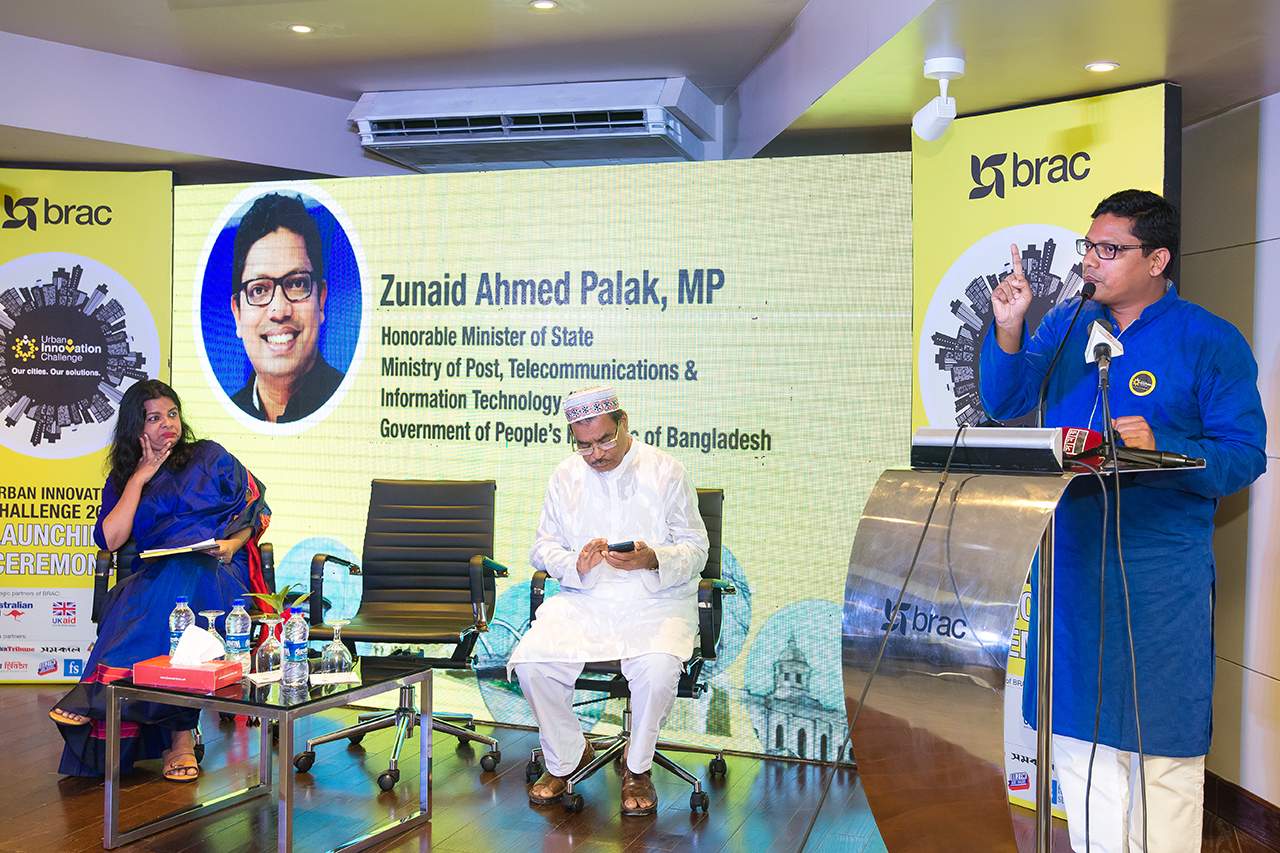
Savar municipality mayor Mohammad Abdul Gani was present at the programme as special guest. The panel speakers at the event were Tina Jabeen, investment adviser, Startup Bangladesh, ICT Division, Munir Hasan, coordinator, Youth Programme, Prothom Alo, Saif Kamal, founder, Toru Institute of Inclusive Innovation, and Rubana Huq, managing director, Mohammadi Group.
In the 'Entrepreneurs talk' session the speakers were Abu Sayed Al Sagor, chief executive officer, BD Assistant, Farhana Rashid, co-founder, Bhumijo, and Shahriar Hasan Jisun, chairman, Bloodman.
BRAC senior director Asif Saleh said, 'We are intent on providing scope and necessary assistance so that the different innovative ideas for solving urban problems can be translated into social entrepreneurships.' He also called on the investors to take initiatives to nurture the country's young talents.
In this competition event plans for sustainable solutions addressing different urban problems in five categories can be submitted from across the country. The categories are housing, healthcare, safe water and hygiene, renewable fuel resources, and climate change. A jury board, after analysing the merit of these plans, will declare awards in all the categories.
BRAC will grant a period of six months to the winning team to implement their plans with a grant of up to BDT 5 lakh. BRAC will also help the winning teams establish contact with probable investors.
Deadline for submission of applications: 30 August 2018.
To send applications please log-in to: uic.brac.net
BRAC wins OFID Annual Award for Development for humanitarian support to Rohingyas
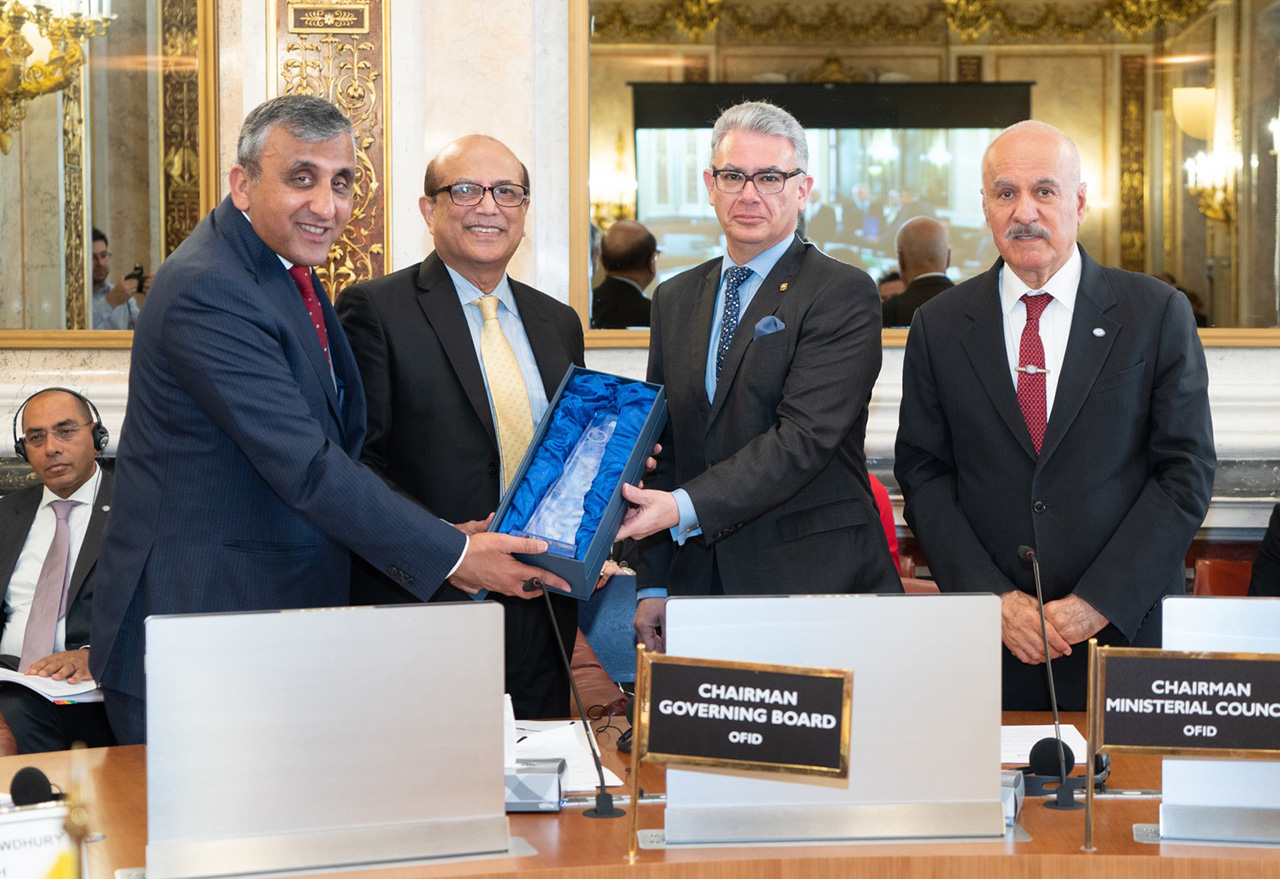
The OPEC Fund for International Development (OFID) has awarded its annual development award of 2018 to BRAC for its continued humanitarian support programme for the Rohingya people who have taken shelter in Bangladesh.
OFID, the development platform of the members of the Organization of the Petroleum Exporting Countries (OPEC), has been giving this award since 2006.
BRAC has launched the largest civil society response in support of the forcibly displaced Myanmar nationals of Rohingya community who took shelter in Bangladesh in the aftermath of the incidents of 25 August 2017. BRAC's response programme is meeting the immediate needs of the vulnerable people, while building skills, resilience and awareness that will facilitate their long-term wellbeing as the situation evolves.
The 2018 OFID Annual Award for Development comes with a monetary reward of US$100,000. BRAC will use the award money to provide further support to Rohingya women and children.
Since launching its response activities, BRAC has provided over 660,000 people with at least one form of critical support. It is working closely with the government of Bangladesh, the United Nations, and local and international organisations, and will continue to provide a range of services through its integrated, community-based approach. BRAC has so far mobilised around US$37 million from different partners in its efforts to strengthen the humanitarian work in Cox’s Bazar where the Rohingya people have been given shelter.
The award was presented by Dr Carlos Alberto Patricio Játiva Naranjo, Ecuador’s head of delegation and OFID governor, ambassador and representative to the Vienna-based international organisation.
Accepting the award Dr Mushtaque Chowdhury, the vice chairperson of BRAC, said. "We at BRAC are delighted to accept the OFID Annual Award for 2018."
"This will inspire us and many others to move forward with added zeal and commitment. The monetary award will be used to further support Rohingya women and children," he further said.
OFID Director-General Suleiman J Al-Herbish remarked: "This year’s award aims to help shed light on the Rohingya crisis and recognise one particular organisation for standing strong in the face of injustice." He added that BRAC "empowers the vulnerable and helps them bring about positive change in their lives by creating opportunities."
"Presenting this award to BRAC is consistent with OFID’s approach – through its Grants Program – of responding to the needs of the world’s most disadvantaged and vulnerable groups, and addressing the underlying root causes of poverty in developing countries," he added.
It is estimated that over 700,000 refugees have fled from Myanmar to Bangladesh since August 2017. BRAC has provided lifesaving services at scale in the sectors where it is currently a leading provider, such as water and sanitation, health and child protection, and has contributed substantially to others, including education, shelter and nutrition.
Past winners of the OFID Annual Award for Development include, among others, the Foundation for Integral Development in Guatemala; the Children’s Cancer Hospital in Egypt; and Malala Yousafzai of Pakistan.
Global Week of Action: Urging children's right to safe roads
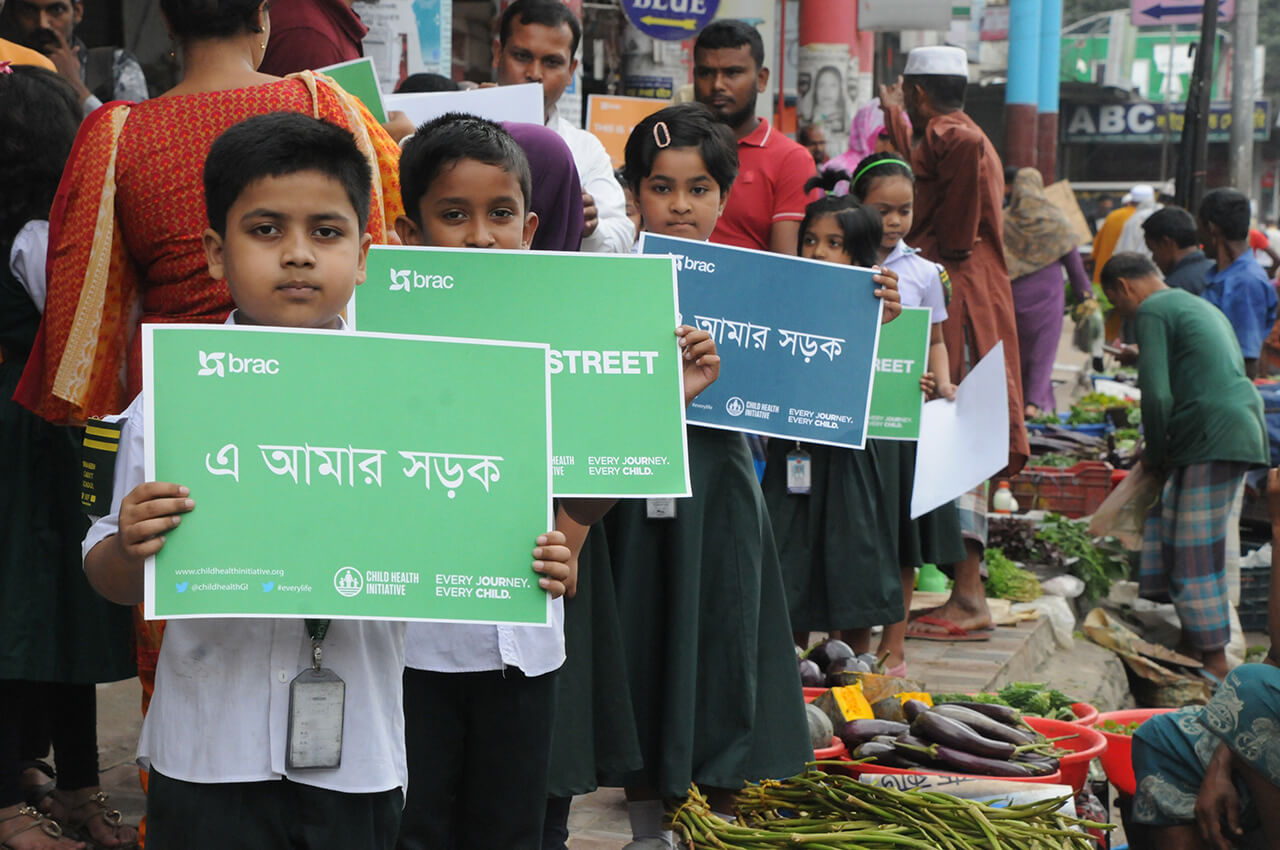
The Global Week of Action on Road Safety was observed in 21-27 May this year. On this occasion Child Health Initiative, an international organisation focusing on child health, stressed the importance of reducing road traffic crashes to improve the overall status of public health at the UN World Health Assembly in New York. The organisation also highlighted the issue at the recent conference of International Transport Forum held in Leipzig, Germany. They called on the non-governmental organisations to observe Global Week of Action on Road Safety this year upholding children's right to safe road.
Responding to the call the Global Alliance of NGOs for Road Safety observed the week across the world. As a member of the Alliance BRAC organised a series of programmes during the week call on the nation to work together to improve road safety for our children. FIA Foundation, an international organisation promoting creative initiatives to ensure road safety, supported BRAC in organising these events.
To observe the week BRAC Road Safety Programme organised drawing competitions for children in schools in and outside Dhaka focusing on the issue of road safety. A signature campaign was also organised in which transport owners and workers, teachers and employees of different government and private organisations took part, pledging that they would do their best to ensure road safety from their respective positions. BRAC social media platforms also ran a campaign with road safety awareness messages and stressing the significance of the week.
For Bangladesh the observance of this week is particularly important because every year a large number of children die and become injured in road traffic crashes. Many of these road crashes occur during their commuting to school. According to an estimate of 2016, every year 5,000 children, with an average of 14 children every day, die in road traffic crashes. Many of these children lost their life while on their way to or from school.
Employment generation poses major challenge
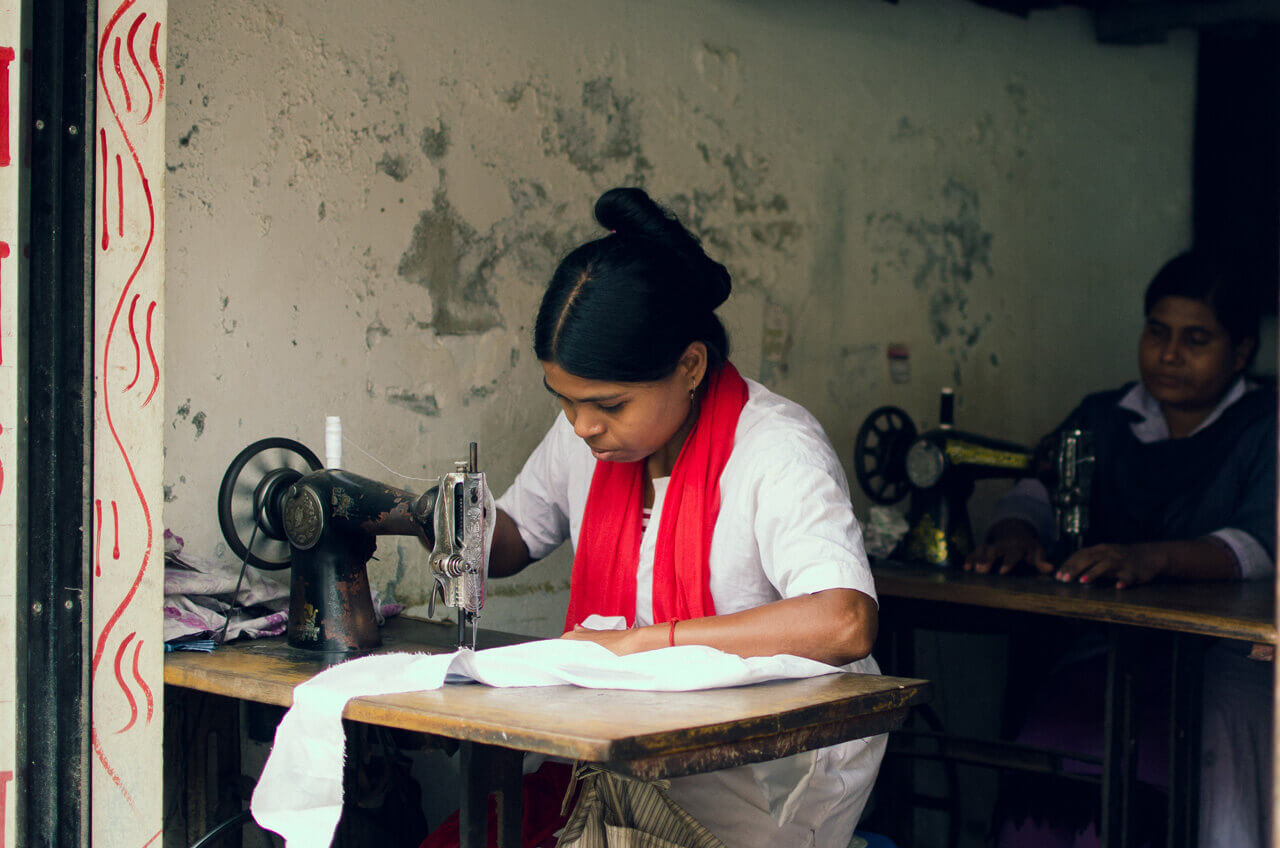
Employment generation will be the major challenge in the forthcoming national budget of fy2018-19, people responding in a recent countrywide pre-budget survey viewed. To ensure robust national development, they also stressed stronger and effective spending in five areas, namely education, health and medical care, roads building and maintenance, adequate subsidies in agriculture, and establishment of more industrials units and factories.
BRAC and Institute of Informatics and Development (IID) conducted the survey as a part of a study to identify the people's priority areas in the next national budget and review the progress of the implementation of the budget of the outgoing fiscal of 2017-18. The survey was conducted in all the 64 districts with participation of 3,846 randomly selected respondents.
Among the areas and issues the respondents gave most emphasis are: in education sector stipends and allowances for students (25%), supply of books and other education materials (24%), and establishing schools, madrassahs and colleges (18%); in health sector low cost treatment facility (42%), establishing hospitals and clinics (19%), and healthcare for the poor (12%); in agriculture sector supply of farming equipment and inputs in low cost (63%), low interest micro-loans (16%) and marketing facilities for farm produces (5%); in social security sector allowances for senior citizens (35%), shelter for the homeless (17%), and widow allowances (9%); in disaster preparedness sector appropriate measures for timely disaster forecast (47%), health and medical care both during and after disasters (10%), and building embankments to protect lives and resources against floods and storm surges (9%); and in migration sector increasing government assistance at the local level (34%), easy loan facility (21%) and increasing information flow from the government at the village level (20%).
The study report expects that money flow may increase with a reduction in revenue earning in the new budget coinciding with the next general election. Having analysed the budgets and their spending trends, the report said that the budget of fy2018-19 will be an election budget. The revenue earning might decrease, while the government spending will rise during the first six months, leading to an increased internal borrowing, such as borrowing from the banks. The overall situation may have a negative impact on the national economy.
The study also forwards three recommendations, based on a review of the spending of the budget of the outgoing fiscal and people's priorities as reflected in the survey:
- Give priority to aligning budget allocations along the social sectors according to the demands of the country's financial development and SDG targets to be achieved by 2030
- Strengthen private enterprises' participation under public-private partnership (PPP) in realising big projects, and
- Utilise public money and other resources, establish and strengthen transparency in public spending, and ensure timely and proper implementation of public sector development projects to ensure continued socio-economic progress of the country, particularly to effectively deal with the challenges Bangladesh may face in the coming years after it graduates to the club of developing countries from that of the least developed countries (LDCs).
BRAC provides safe driving training for Navy personnel
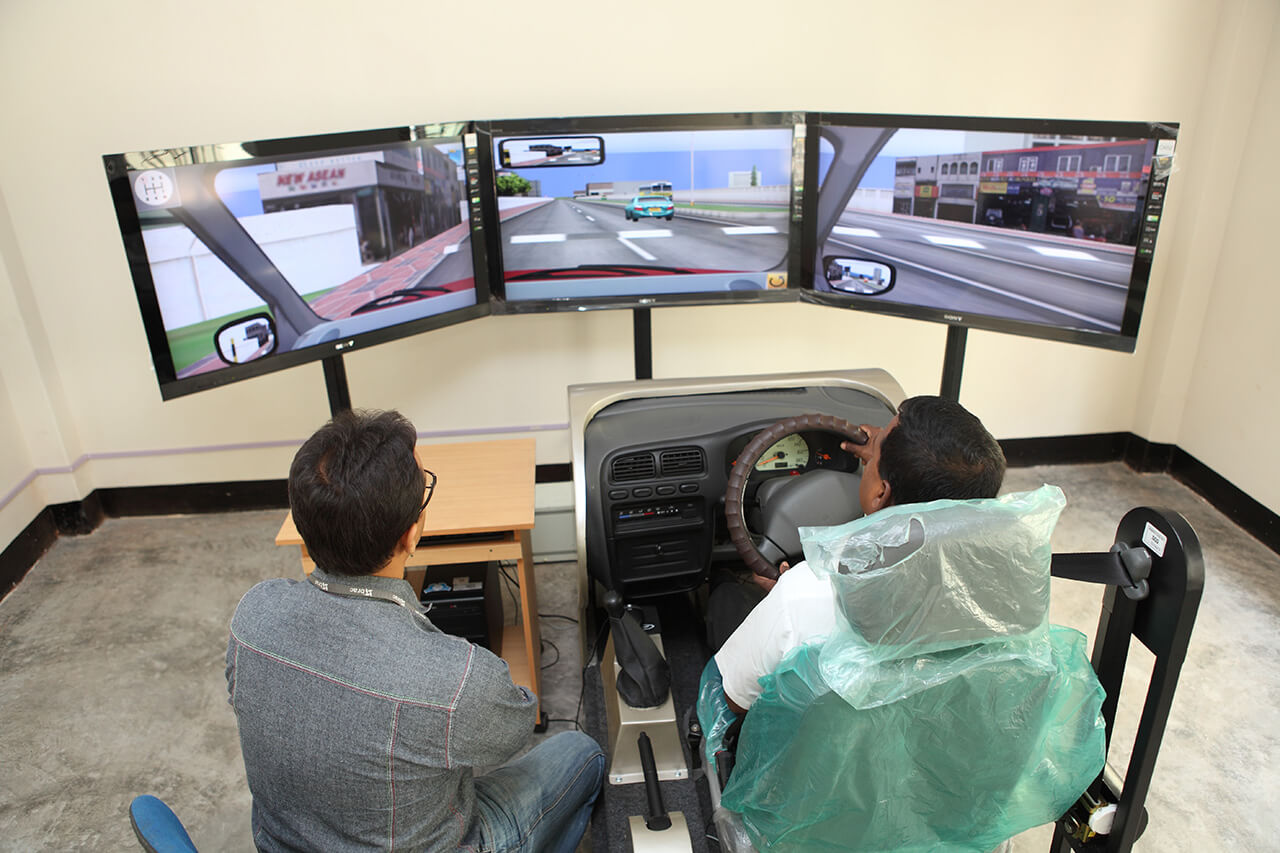
BRAC recently organised an international level training for the transport drivers of the Bangladesh Navy, focusing on awareness building and behavioural change for safe driving. 22 drivers of the Bangladesh Navy participated in the three-day-long training at BRAC's driving school in Uttara in the capital, starting on 22 April 2018.
The course appropriately combines hands-on training and theoretical knowledge with a special focus on the former.
BRAC undertook the training titled 'Road safety and safe driving training', in short 'Surokkha', in 2014, realising that raising awareness and capacity building are critical in reducing the extremely high rate of road crashes in Bangladesh. In this initiative, BRAC has partnered with Hubert Ebner Ltd, an internationally acclaimed organisation specialising in automobile driving training and road safety issues.
Trainees are exposed to lessons related to safety measures on the road, techniques on self-protection while driving, and desired behavioural change. For the practical competency part of the training, drivers are tested on their ability to operate safely through the ‘P-Drive’ technique.
Under BRAC's road safety programme, BRAC Driving School similarly trained over 1,200 individuals so far. It has been observed that drivers who underwent the 'Surokkha' training were reported to have displayed considerable change in their behaviour in adapting to safe driving techniques.
Bangladesh Road and Transport Authority (BRTA), Dhaka Metropolitan Police and Dhaka Transport Coordination Authority in a recent news report attributed over 90 per cent road crashes to rash driving. Experts stress awareness raising and capacity building for skilled, safe and responsible driving to reduce the excessively high rate of road crashes.
A discussion session also took place during the training in which Lieutenant Commander Sanjida Hossain and Lieutenant Commander M Enayet Hossain were present. The speakers at the discussion emphasised that the drivers should mindfully apply their learning in the training while behind the steering wheel.
31 million face legal issues every year, land disputes most severe
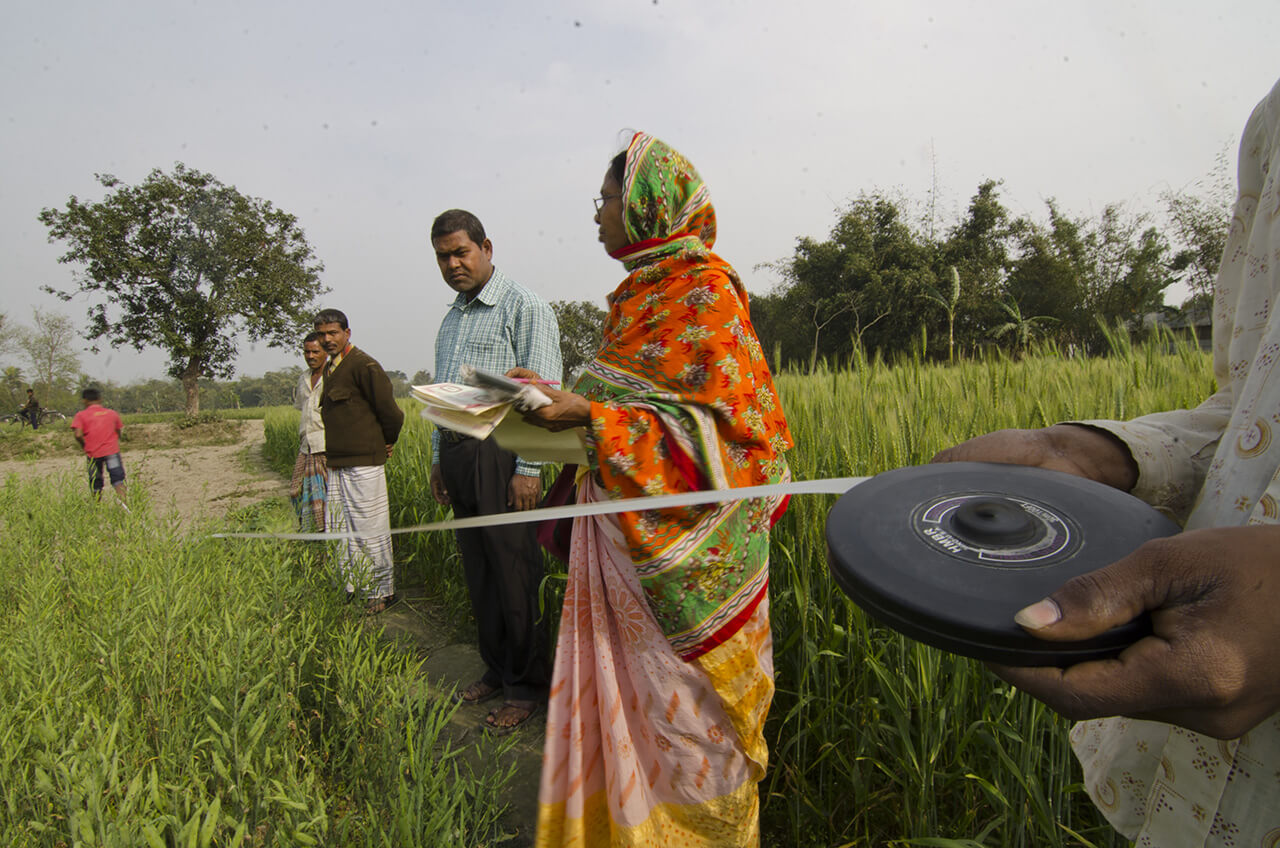
Every year in Bangladesh, 31 million people confront with legal challenges. A majority of these challenges occur when dealing with neighbours, and the most complicated ones arise when dealing with land related issues. This was among the findings presented at the launching event of the report titled ‘Justice Needs and Satisfaction in Bangladesh 2018’ at the capital’s BRAC Centre today on Wesnesday (May 9, 2018).
This research was conducted and published in collaboration between Netherlands based nonprofit The Hague Institute for Innovation of Law (HiiL), the Government of Netherlands, and BRAC. The framing questions for the research included what kind of legal dilemmas people face in Bangladesh, how they deal with those issues, who or which institutions they seek for help to resolve their concerns, and the level of responses they receive.
The study was conducted through in-depth qualitative interviews of around 6000 respondents who have randomly selected in 64 districts of the country. The study was conducted in August and September of 2017.
The chairman of the National Human Rights Commission, Kazi Reazul Hoque, was present at the event as its chief guest. Also present as special guests were the head of Measuring Justice for HiiL, Dr Martin Gramatikov, and the quantitative justice data analyst of the same organisation, Martin Kind. Programme Head of BRAC's Human Rights and Legal Aid Services (HRLS) Sajeda Farisa Kabir moderated the ceremony.
The key highlights that came out from the study include: 31 million people face legal dilemmas every year. The major types of legal issues they face include, among others, issues with neighbours (40%), land disputes (29%), criminal offences (21%), family disputes (12%), money related issues (12%), social welfare (11%), consumer problems (9%), and accidents and personal injury (8%).
In terms of the severity of the issues, land related legal disputes come out on top of the rest. The severity of the problems as reported by percentage: land disputes (25%), neighbours (22%), crime (12%), family disputes (7%), money (7%), social welfare (5%), housing (4%), and accidents and personal injury (4%).
To ensure more effective dispute resolutions and ensure better justice mechanism a number of recommendations were drawn in the report, which include among others: prioritisation of legal problems to solve them, improve information delivery, design and provide affordable and accessible justice journeys for all, explore the full potential of hybrid justice mechanisms, justice innovation and digital innovation.
Tackling multiple challenges will boost women employment in ICT
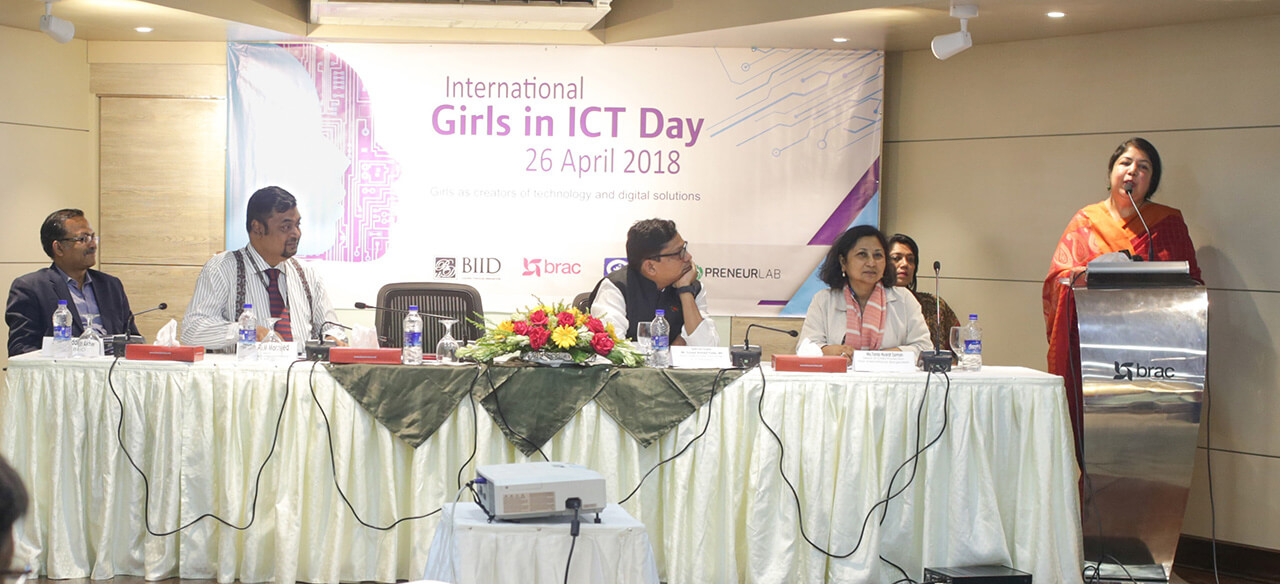
Involvement of women in information and communication technology will significantly strengthen their social and economic empowerment. It will in turn have important contribution in achieving the Sustainable Development Goals particularly the SDG-5. However, the effort to meaningfully expand women's engagement in the ICT sector entails tackling a number of challenges including social and family hurdles, lack of required knowledge and skills, lack of inspiration and fear about security in the virtual space.
These observations were made today on Wednesday (25 April, 2018) in a study presentation on the obstacles for women's participation in the information and communication sector. It was presented at a discussion organised at the BRAC Centre in the capital. Shahid Uddin Akbar, chief executive officer of the Bangladesh Institute of ICT in Development (BIID), delivered the presentation. BIID conducted the study for which 164 female students studying in different universities were interviewed.
Dr Shirin Sharmin Chaudhury, speaker of Bangladesh Parliament, was present at the event as the chief guest at the event with Zunaid Ahmed Palak, state minister for ICT and lawmaker, attending as special guest. BIID, BRAC, Plan International Bangladesh and Preneurlab jointly organised the programme on the occasion of International Girls in ICT Day to be observed on 26 April.
Tania Nusrat Zaman, head of child protection, Plan International Bangladesh, gave the welcome speech. KAM Morshed, director of Advocacy for Social Change, Technology and Partnership Strengthening Unit, BRAC, and Rabiul Alam Chowdhury, head of IT, Plan International, forwarded the recommendations to widen the scopes for women's participation in the sector.
The study observes that if women's participation in the ICT sector can be increased from the current 33.7 per cent to 82 per cent, it will result in 1.6 per cent more GDP growth. This achievement would help the country make stronger strides towards its SDG targets.
In this interview-based study three major challenges for ICT education for young women have been referred which are, bringing change in the perception of young women about ICT education, lack of knowledge and skills in ICT and lack of required skills to engage in the sector.
Dr Shirin Sharmin Chaudhury said in her speech stressed three areas of work to strengthen women's participation in ICT sector which are, undertaking focused effort to popularise the sector among women, recognise ICT as a specialised sector requiring specialised human resources and spread the message that it is a sector that will reconstruct the future.
"The government targets to ensure equal stake of men and women by 2030. To achieve the target the government has undertaken digitalisation initiatives with equal emphasis on the rural and urban areas, which will continue in future," he further said.
Emphasising IT education she suggested that 'IT scholarship' may be a convenient motivation to create awareness among students.
Zunaid Ahmed Palak said that to boost youth employment in the ICT sector the Bangladesh government will train 300 thousand youths, both men and women, by 2021. "We have reserved 20-30 per cent quota for women trainees in this initiative," he further said, pointing out that two million youth enter the country's job market every year.
Participants in the open discussion stressed updating of curriculums for ICT and digital technology education to broaden the equal opportunity space, motivating more women to actively participate in the sector and establishing women-friendly workplace.
High officials from the government and international organisations and representatives from the NGOs were also present at the event.
The International Telecommunication Union in collaboration with the United Nations has been celebrating the day on the fourth Thursday of April for some years now. Since 2011 more than 30 thousand women have been celebrating the day in 166 countries across the world.
Malaria deaths down, risks still remain in Chattogram Hill Tracks
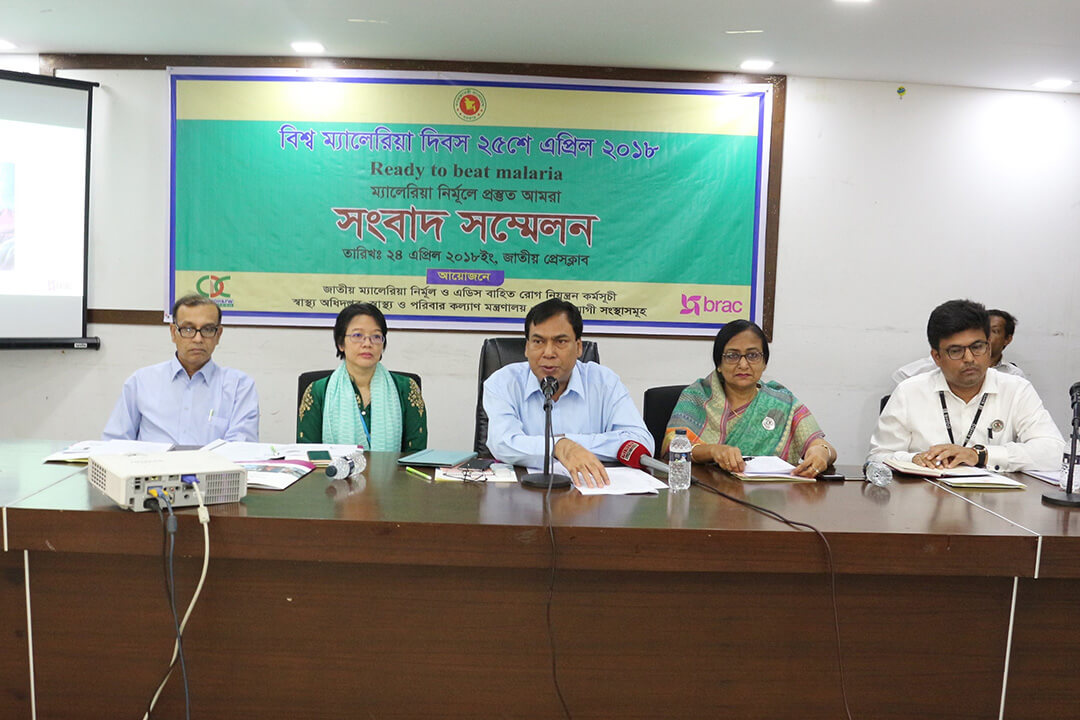
Press conference on World Malaria Day held
Three districts, Bandarban, Rangamati and Khagrachhari, are in considerable risk of malaria despite much has been achieved in checking the menace of the mosquito-borne disease. According to the National Malaria Elimination Programme (NECP), currently 93 per cent of the country's 29 thousand and 247 malaria patients are from these three districts. The major reasons for these districts to have most malaria patients are their hilly frontiers, profuse rain, large forest area, inadequacies in healthcare system and problems faced while reaching treatment and other healthcare services.
Experts revealed this information at a press conference today on Tuesday (24 April 2018) organised at the National Press Club in the capital. The government National Malaria Elimination Programme and BRAC organised the event on the occasion of World Malaria Day 2018 observed on 25 April.
The press conference was arranged to disseminate information on the future activities required to eliminate malaria, challenges in risk mitigation and recommendations as well as public awareness messages.
Director-general of the Directorate General of Health Services (DGHS) Professor Dr Abul Kalam Azad spoke as the chief guest of the event. Director of the government Disease Control unit and also line director of Communicable Disease Control unit Prof. (Dr) Sanya Tahmina, director of BRAC's Communicable Diseases, WASH and DMCC programmes Dr Md Akramul Islam, and head for its communicable diseases and WASH programmes Dr Moktadir Kabir also spoke among others.
DGHS epidemiologist Dr Md Mosiqure Rahman moderated the press conference.
DGHS deputy programme manager for malaria and Aedes transmitted diseases Dr MM Aktaruzzaman delivered the keynote presentation, highlighting the country's success in eliminating malaria.
The speakers pointed out that malaria, being one of the major public health problems of Bangladesh, plague its 71 upazilas of 13 districts, namely Rangamati, Khagrachari, Bandarban, Cox's Bazar, Chattagram, Sunamganj, Moulvibazar, Sylhet, Habiganj, Netrokona, Mymensingh, Sherpur and Kurigram.
It also mentioned that malarial deaths have much reduced lately, thanks to the collaborative efforts and effective measures by the government and non-governmental actors. While in 2014, 45 patients succumbed to the infection, in 2015 the number fell to only 9 (nine). However, 2016 saw a little rise in the number of deaths at 17, to drop again in 2017 to 13.
Professor Dr Abul Kalam Azad said, "Our goal is to eliminate malaria completely from Bangladesh by 2030. To achieve this goal we are working to prevent the disease from occurring in eight among the 13 vulnerable districts, while make sure that 51 districts are entirely free from malaria."
Prof.(Dr) Sanya Tahmina said, "We have already produced a guideline for the travellers to the hilly regions that will help reduce their risk to contract malaria." The government has also undertaken an initiative to distribute 333 thousand mosquito nets to the hilly regions and among the Rohingya people who have taken refuge in Cox's Bazar after being forcibly evicted from Myanmar, she further said.
Dr Md Akramul Islam said, "As the world's largest non-governmental actor BRAC is resolutely extending the malaria elimination programme in the camps sheltering the Rohingyas."
The keynote presentation also highlighted some of the major challenges for malaria elimination: Shortage of physicians and healthcare professionals in the remote areas limiting the capacity for treatment and healthcare service delivery, people's increased mobility, increased risk of malarial infection in the border areas and climate change impacts.
To observe World Malaria Day 2018 a parade will be organised tomorrow on Wednesday, starting from Zero Point in the capital to end at CIRDAP. A discussion session will follow at 11am at the CIRDAP auditorium. Health and family welfare minister and lawmaker Md Nasim will be present at the discussion as the chief guest.
The theme of World Malaria Day 2018 is "Ready to beat malaria".
14 journalists awarded in BRAC Migration Media Awards
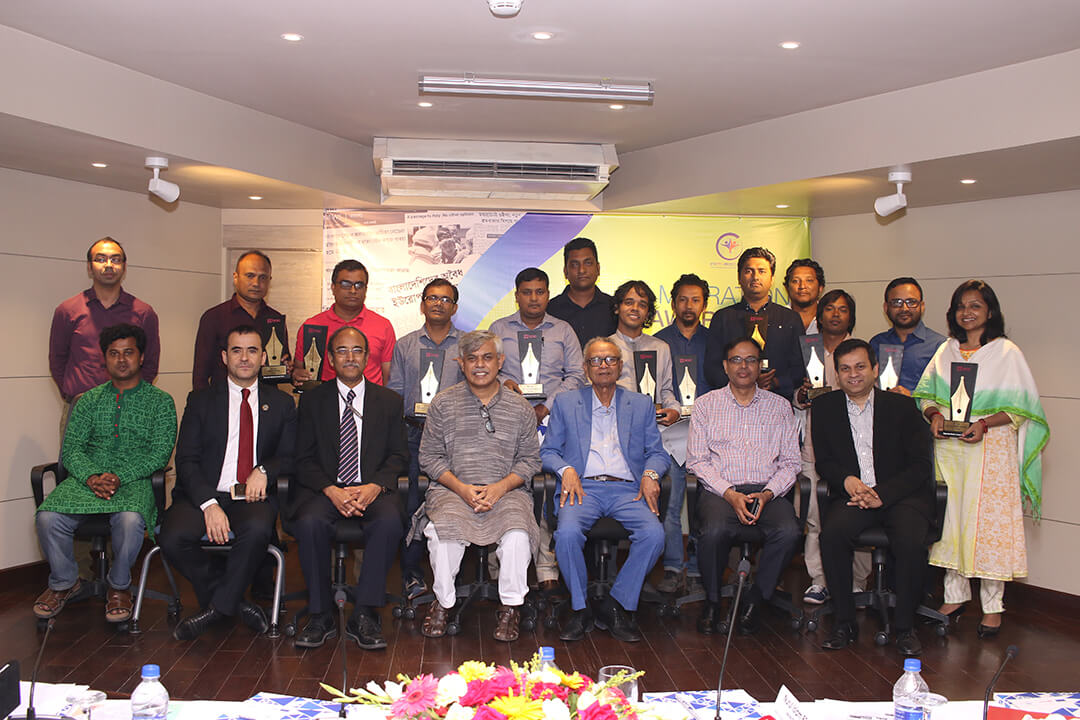
The BRAC Migration Media Award, held on 18 April, recognised the contributions made by journalists in protecting the rights of migrants and their families. The award ceremony was held in BRAC Centre, announcing winners under six categories, including national and local print newspapers, television, radio, online news sites and photography.
In the national newspaper category, the first winner was Abu Jar Ansar Uddin Ahammed of Samakal. The second prize was awarded to Adil Sakhawat from Dhaka Tribune, and the third to Muhammad Wasim Uddin Bhuiyan from New Age.
In the local news category, the winner was Md Kamrul Islam of Dainik Jalalabad. In television reporting, the first winner was Ashish Kumar Sarkar of Somoy Television, and the second winner was Jhumar Bari of Ekattor TV, and the third winner was Mashreq Rahat of Masranga Television.
In the radio category, the winner was Saleh Noman of Radio Today.
In the online news category, the first winner was Md Fazlur Rahman of Dhaka Tribune. The second winner was Md Kawsar Azam of thereport24.com, and the third winner was Jasmine Akhter of Bannernews.
For the first time, we introduced the category of photography to recognise the contribution of photojournalists. The first winner was Saiful Islam Ronny, and in second was Abdus Salam of Prothom Alo. The third winner was Mahmud Hossain Apu of Al Jazeera and Dhaka Tribune.
The Expatriate Welfare and Overseas Employment Minister, Md Nurul Islam was the chief guest at the event, while writer and journalist, Anisul Huq joined as the main speaker. BRAC’s executive director, Dr Muhammad Musa, deputy country representative of IOM, Abdusattar Esoev, director general of the Bureau of Manpower, Employment and Training (BMET), Md Selim Reza, BRAC’s senior director, Asif Saleh, and head of BRAC’s migration programme, Shariful Islam Hasan were also present at the event.
The minister of Expatriate Welfare and Overseas Employment said, "BRAC's work in the migration sector is commendable. All the information we receive come from these journalists. This is an exceptional initiative to recognise the efforts of those journalists who cover the most urgent issues on migration. We are all working so that people can go abroad safely and properly.”
Journalist and writer Anisul Haque said, "Today there are more than one billion people abroad. More people will go abroad in the next few years. Expatriate income is now the biggest driving force in the economy of Bangladesh." Regarding the role of journalists, he said, "The media is working towards creating awareness, as well as contributing towards reshaping policies."
The director general of BMET, M Selim Reza said, "We are now focusing more on the skills of migrants. The demand for Bangladeshi workers abroad is also increasing.”
The deputy country representative of the International Organisation of Migration, Abusattar Esoev said, "We are working in cooperation with the government and non-government organisations, such as the United Nations immigration agency. This cooperation will continue.”
Asif Saleh, BRAC’s senior director said, “We can ensure good governance in this sector if the government and non-government organisations work together in alliance. We can send people abroad in a safe and efficient way.”
Presenting the keynote paper on the role of media in protecting the rights of immigrants was Shariful Islam Hasan, head of BRAC’s migration programme.
Professor Robayet Ferdous of the Mass Communication and Journalism Department of Dhaka University was present on this occasion, along with KM Ali Reza, deputy head of Expatriate Welfare and Overseas Employment Ministry; Shahnaz Munni, chief news editor of News24; photojournalist Pavel Rahman, and Sarwat Binte Islam, senior programme manager of Manusher Jonno Foundation.
BRAC-ISD commences journey to improve employment opportunities
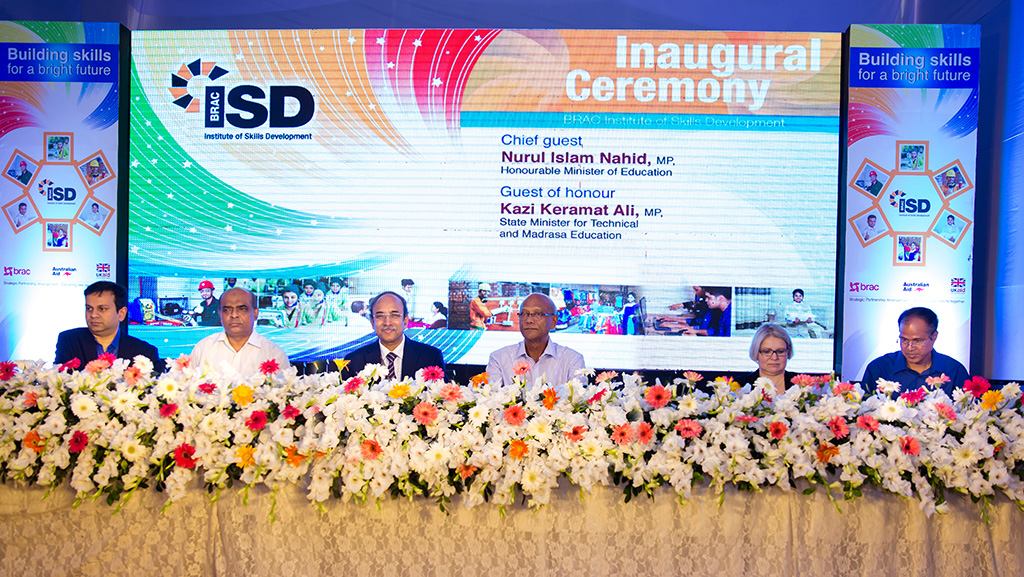
Focus on building skills workforce to achieve SDG target
Nearly 87 percent of the country’s total workforce are involved in farming, small businesses and other forms of informal occupation. A large segment of the workforce is not being properly utilised in the skilled sectors. Many of these people are unable to enter the formal employment sector due to a lack of demanded professional skills and knowledge. This is a considerable barrier for the entire country in terms of meeting the Sustainable Development Goals.
These insights were revealed at the inauguration ceremony for BRAC Institute of Skills Development held in the capital’s Uttara area today, 10th April 2018. The Honourable Minister of Education, Nurul Islam Nahid MP inaugurated the event as the chief guest.
Among the other guests present were Alfaz Hossain, Project Director at the Bureau of Non-Formal Education, ABM Korshed Alam, Chief Executive Officer of National Skill Development Council Secretariat, Beatrice Kaldun, Head of UNESCO Dhaka Office, Dr. Muhammad Musa, Executive Director of BRAC. BRAC’s Senior Director for Communications, Strategy and Empowerment, Asif Saleh, gave presentation on the skills context in Bangladesh.
It was mentioned in the presentation that more than 2 million people are entering the workforce every year in Bangladesh. The number of people readily seeking employment is estimated to rise up to 76 million by the year 2025 in Bangladesh. With almost 60 percent of the current population entering the workforce being 30 years and younger, close to 40 percent of these young people are being left unskilled and unemployed. To tackle these issues with innovative and impactful interventions, BRAC launched the Skills Development Programme in 2015. BRAC Institute of Skills Development is starting its journey as an extension and scaled up model of the programme.
BRAC-ISD provides market driven skills training covering a wide range of sectors – from information technology to hospitality and tourism. Learners receive certification that is nationally accredited by the Bangladesh Technical Education Board as well as internationally by City & Guilds. After graduating, BRAC-ISD also supports its learners to secure full-time employment.
Outside of Dhaka, BRAC-ISD operates training centres in Narayanganj, Pabna, Manikganj, Rangpur, Magura, Cumilla, Cox’s Bazar and Chattogram.
Nurul Islam Nahid MP said, "education is our utmost priority. But technical skills education also needs considerable attention. However, a big challenge in this field is changing social perceptions surrounding it. Most of our people strongly hold the belief that acquiring a higher education degree is the gold standard to landing decent employment. Some of the other barriers to proliferation of skill based education include interest from women to get involved and shortage of trained instructors."
He also added, "currently we have 49 polytechnic colleges across the country that offer four-year long programmes. With the aim of enhancing skilled workforce, the Government is also planning to establish 38 more polytechnic institutes." The Minister stressed on the fact that institutional training should focus more on modern methods instead of outdated practices.
Beatric Kaldun stated, "A significant emphasis is being placed on creating long-term decent employment opportunities to meet the targets set in SDG 8. From today's discussion it is clear to me that a large portion of people in Bangladesh entering the workforce are below 30 years of age. It is not enough to just give them skills training, but rather to ensure that the training given fulfills the needs of the market."
Dr. Musa also emphasised on improving the skills development scenario and better quality training to ensure greater opportunities both locally and abroad.
To know more about BRAC ISD click here.
Join the world’s biggest family


